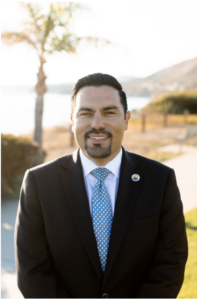What inspired you to enter city management?
My interest in city management was inspired during my internship within the city manager’s office for the city of Villa Park. It became apparent to me the substantial influence one could have in shaping a community and the pivotal role that effective city management played in determining its future trajectory. I had the privilege of working under remarkable city managers whose unwavering support, encouragement and commitment to my professional development were instrumental in solidifying my dedication to a career in city management. Their mentorship was exemplified through exposure to intricate projects, fostering a comprehensive understanding of the multifaceted responsibilities inherent in effective city governance. This formative experience significantly shaped my journey and underscores my commitment to contributing meaningfully to the profession of city management.
Park. It became apparent to me the substantial influence one could have in shaping a community and the pivotal role that effective city management played in determining its future trajectory. I had the privilege of working under remarkable city managers whose unwavering support, encouragement and commitment to my professional development were instrumental in solidifying my dedication to a career in city management. Their mentorship was exemplified through exposure to intricate projects, fostering a comprehensive understanding of the multifaceted responsibilities inherent in effective city governance. This formative experience significantly shaped my journey and underscores my commitment to contributing meaningfully to the profession of city management.
How did you become a city manager?
During my tenure as assistant city manager in Pismo Beach, I would regularly serve as acting city manager, which established relationships with the City Council. Subsequently, when the city manager opted for a new opportunity, I was entrusted with the role of interim city manager for a period of five months. Recognizing my interest in the position, my predecessor actively supported my candidacy by engaging with the City Council. My readiness for the role included preparation as assistant city manager, participation in the CCMF New and Future City Managers Seminar and being active in various professional development organization. I also leaned on my network and mentors to help me adequately prepare for the interview process and my transition after being selected as city manager.
What do you enjoy the most about your role?
I enjoy being a problem solver. In the dynamic realm of city management, each day presents a unique set of challenges and I find great joy in leveraging my experience and expertise to address these issues effectively. This profession demands a versatile mindset, and the ability to navigate uncertainties by drawing upon past experiences to effectively manage the organization. The unpredictable nature of municipal governance underscores the importance of adaptability and strategic thinking.
What role does a city manager play in local government, and how do you feel it differs from that of a Council Member or Mayor?
The City Council sets policy, and the city manager implements direction. While the city manager may provide recommendations on policy, it is only one data set that the City Council utilizes to execute the will of its people. I like to use the analogy of a ship to explain the difference. The City Council sets the destination/policy of where the ship is going, and the city manager recommends the appropriate type of ship and the resources that are needed to get the ship to its destination. The city manager’s role includes adjusting its sails, course correction and fine-tuning resources, as necessary. It is important that both the city manager and City Council understand and have mutual respect for each other’s role.
What does your typical day look like?
Meetings, lots of meetings and coordination, but unlike when I was assistant city manager, my role is that of an advocate and cheerleader. During interactions with the City Council, I am championing the achievements of the staff, offering updates, and decision points for upcoming council meetings. With staff I am cheering for their success and learning about their initiatives. Community interactions, on the other hand, become platforms for celebrating the city’s capital improvements and spotlighting the Council’s commitment to reinvesting in the city. The most important part of my day is listening, understanding perspectives, gaining insights and making informed decisions that best serve the city’s objectives.
What city project are you most proud of?
I take great pride in our new Public Safety Facility, a monumental $50 million project encompassing a state-of-the-art Police and Fire Station, set to break ground in May 2024. This visionary undertaking, conceived over two decades ago, has come to fruition through innovative approaches such as alternative procurement methods, collaborative design processes, and creative financing strategies. The transformative impact of this project is underscored by the city’s transition from the county’s worst response times to the best, facilitated by a modern facility poised to serve the community for the next half-century. Beyond the operational enhancements and increased safety for our employees, the project’s financial ingenuity is noteworthy – nearly entirely funded through tourist and visitor contributions, adding an extra layer of satisfaction to this significant accomplishment. This Public Safety Facility stands not just as a physical structure but as a testament to our commitment to public well-being, community resilience and strategic fiscal management.
What are the greatest challenges facing city managers in the state today?
The erosion of civil discourse poses a formidable challenge to local government, as it undermines the fundamental principles of democratic governance. When public discourse becomes polarized and characterized by hostility, it hampers the ability of local officials to engage in constructive dialogue, hindering the formulation of effective policies. The breakdown in civil discourse can lead to a fractured community where diverse perspectives are dismissed rather than deliberated upon. This not only weakens the democratic process but also diminishes the trust citizens place in their local government. As a result, the capacity to address pressing issues and find common ground diminishes, potentially leading to governance failures and an overall deterioration of the social fabric within a city. Rebuilding a culture of respectful and open discourse is imperative for fostering a healthy civic environment and ensuring the effective functioning of local government.
When and how do you interact with the residents of your city?
I like to be available and approachable to our residents. It is a shared commitment between the City Council and me. I started a community series titled “Coffee and Conversations,” a monthly event hosted at a local coffee shop where I am joined by a department head, on a rotating basis. This series offers an informal platform for residents to engage with us. With no predetermined agenda, it provides a genuine opportunity for people to express their thoughts and concerns. The positive reception of this program has not only strengthened community relations but has also served to bolster support for our local businesses. As a small city, I also enjoy being able to serve people at the front counter to assist residents with walk-in questions. This hands-on approach not only keeps me well-informed about community concerns but also provides valuable insights into the experiences and challenges faced by our staff, ensuring a well-rounded understanding of the community’s needs.
What is the role of a City Manager in upholding the public’s trust in local government?
The role of a city manager in upholding the public’s trust in local government is multifaceted and crucial. city managers serve as professional administrators responsible for implementing policies and managing daily operations, acting as a bridge between elected officials and the community. To uphold public trust, they must ensure transparency in decision-making processes, providing clear information to the public about government actions. Additionally, city managers should promote accountability by fostering a culture of ethical conduct and responsible financial management. Engaging with the community, listening to concerns and incorporating citizen input into decision-making processes are essential to building trust. Effectively communicating the city’s goals, challenges and achievements also plays a vital role in transparency. Ultimately, by demonstrating competence, responsiveness and a commitment to the public interest, city managers contribute significantly to maintaining and enhancing the trust that residents place in their local government.
How are cities shaping the future of California?
Cities play a pivotal role in shaping the future of California, influencing economic, social, and environmental dynamics. They serve as hubs for innovation, technology and culture, contributing significantly to the state’s economic growth and vitality. The tourism sector, driven by these cities like Pismo Beach, is a key driver of the economy, attracting visitors and bolstering local businesses. As demographic trends evolve, cities play a central role in adapting infrastructure, housing and public services to meet the changing needs of their communities. Local policies, such as those addressing affordable housing, transportation and water resilience, have a direct impact on the overall well-being and future trajectory of the state, making effective city governance essential for sustained economic prosperity and community well-being.
